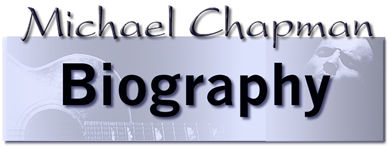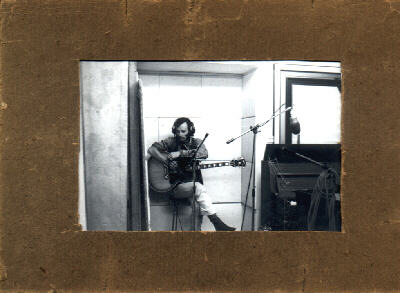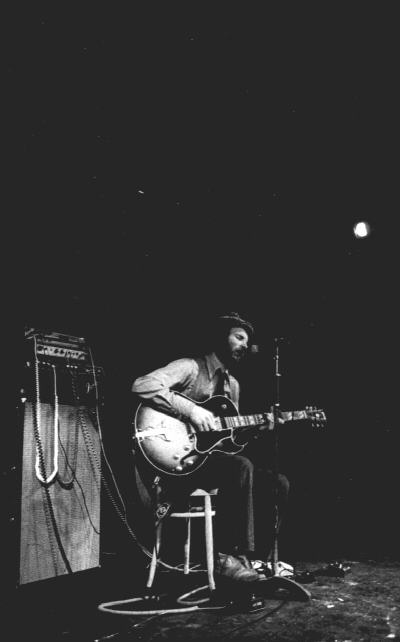|
you are here: michaelchapman.co.uk\biography
contact us | back to main page | how to book michael chapman link: 'In his own words' an interview The guitar and voice of Michael Chapman first became known on the Cornish Folk Circuit in 1967. Playing a blend of atmospheric and autobiographical material he established a reputation for intensity and innovation. Signed to EMI's Harvest label he recorded a quartet of classic albums. LPs like 'Rainmaker' and 'Wrecked Again' defined the melancholic observer role Michael was to make his own, mixing intricate guitar instrumentals with a full band sound. The influential album 'Fully Qualified Survivor', featuring the guitar of Mick Ronson and Rick (Steeleye Span) Kemp's bass, was John Peel's favourite album of 1970. 'Survivor' featured the Chapman 'hit', "Postcards of Scarborough", a characteristically tenderly sour song recounting the feelings of nostalgia and regret.
A label change to Decca brought a change in sound. Electric guitar, still with that distinctive Chapman fluidity, featured more prominently. Tracks like "New York Ladies" and "Firewater Dreams" on 'Millstone Grit' showed a guitar master pursuing sounds and textures. Michael continued to build his live reputation, touring solo and with a variety of groups, recording the live album 'Pleasures of the Streets' a strong mix of solo and band performances. He was a regular session contributor to Radio One, and BBC TV broadcast two Chapman Band performances as part of their Sight and Sound series. A lively and accomplished improviser, Michael gained a reputation for re-working material, both before an audience and on record. Songs were seen as standards, themes to be explored, extended and varied on stage and in the studio. The Don Nix produced 'Savage Amusement' featured versions of the Chapman songs "Shuffleboat River Farewell" and "It Didn't Work Out". Different musicians and a different sound breathed new life into earlier material, showing Michael to be a jazz musician in spirit if not in sound. 'The Man Who Hated Mornings' showed the respect Michael commanded among musicians with supporting performances from Andy Latimer of Camel, Keith Hartley and violinist Johnny Van Derek. 1978 brought another label change and the release of 'Playing Guitar The Easy Way', a guitar tutorial record that explained in simple terms, methods of playing the guitar using 12 different instrumental pieces each with a different open tuning. The critically well received albums, 'Life On The Ceiling' and 'Looking For Eleven', showed that Michael had fully absorbed elements of rock as he had done folk during the '60's, to produce a hybrid that mixed folk, jazz phrasing, rock and elements of what became known as New Age Music. In response to public demand Michael recorded a solo album 'Almost Alone' presenting the relaxed eclectic mix that was a Chapman club gig. The '80's saw Michael back with Rick Kemp. Touring as a duo they released the live album 'Original Owners', whose version of "Shuffleboat River Farewell", stripped back to guitar and bass, showed that old dogs could teach new tricks. Anyone hearing the anger of the newer material, coupled with the volume and energy of the Chapman Kemp band Savage Amusement, formed in the mid '80's, was left in no doubt that here was an elder statesman growing more acid, rather than mellower with age. After a period of reflection and lower profile releases, Michael captured the mood of the time with his '87 album Heartbeat, a groundbreaking thematic album featuring a continuous 38-minute piece of music. This was an ambition made possible by the advent of CDs.
Experiments with sequencers and sampling on the 90's track "Geordies Down The Road", an anthem to the death of employment in the North East, assaulted the listener with foundry atmospherics and industrial guitars, showing that Michael wasn't standing still. The albums 'Still Making Rain' and '95's 'Navigation' presented a man whose world-weary voice, given a patina by life and hard living, delivered sensitive, emotional songs. While aware of his past, reinterpreting his hit "Postcards of Scarborough", Michael looked to the future. The playing was more considered than ever before. Fewer notes and space for music to breathe, gave songs like "The Mallard" and "It Ain't So" an almost hymn like intensity. 1995 also saw the publishing of Michael's first novel 'Firewater Dreams', a thinly veiled autobiography, which fleshed out some of his highly personal songs and explored his themes of regret, travel and loneliness. Reviews of his album 'Navigation' show the high regard for Michael Chapman, Mojo 11/95 'Twenty one albums and he is still amazing', Q 12/95 '**** (four stars out of a possible five) and this best album in years. This self-styled old white blues guy from Yorkshire is one of the most under-rated heroes of our time. With his uniquely English melancholic perspective and emotive guitar style he deserves wider recognition.'
contact us | back to index page | how to book michael <updated 11/09> |



